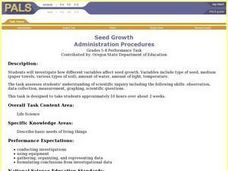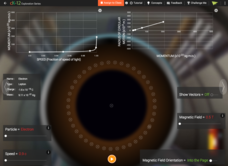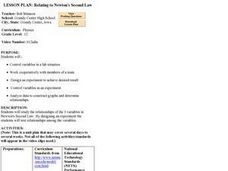Curated OER
Seed Growth
Students develop an independent procedure to investigate the germination of two types of seeds. Students must construct data tables or charts to record observations and results, graph the data, and analyze the data.
Curated OER
Bleach Chemical Reactions
Students learn what happens when bleach comes in contact with various cloth fibers, chemical colors, nature and synthetics.
Curated OER
Power
Young scholars analyze people's sources of power: resources, organization and numbers. They determine when and how power is exercised by analyzing specific examples.
CK-12 Foundation
Stow Lake
Does the depth of a pond matter to the waves created when rain is falling? Many people assume the answer is no, but interestingly, it does matter. Pupils explore this concept and other variables related to wave behavior through a...
Nuffield Foundation
Investigating Osmosis in Chickens' Eggs
You might not be able to learn through osmosis, but you sure can observe it! Scholars observe and measure osmosis using chicken eggs. They control for multiple variables to determine which variables have an impact and how the impact...
Curated OER
Scientific Method: How Many Drops of Water Fit on a Coin?
Young investigators conduct an experiment using the scientific method. They see how many drops of water fit on a coin; have them conduct several different trials. This involves making a hypothesis, looking at controls, and introducing...
Perkins School for the Blind
The Germinator
How does a plant grow from a seed? Observe the process with a clever idea from the PBS television show ZOOM. Watch the video, then have your young botanists create their own germinators. The lesson described here is for visually impaired...
CK-12 Foundation
Galvanometer
In 1820, Hans Christian Orstead discovered the link between electricity and magnetism, which allows us to measure current and voltage. The simulation allows scholars to observe the inner workings of an ammeter and voltmeter as they...
CK-12 Foundation
Particle Tracks
Did you know physicists can identify new particles by observing the path they take in a particle accelerator? Scholars explore the variables that determine the direction and radius of the circular path different particles take. They...
Curated OER
The Abiotic Limits to Purple Loosestrife Growth
Students investigate the effects of soil temperature, water availability, photo period and other variables of the growth of purple loosestrife. They observe the growing conditions of plants and alter them by adding water, isolating the...
Curated OER
Measuring Temperature and the Production of CO2 in Yeast
Students use a model experiment to complete an experiment on yeast. In groups, they identify the independent and dependent variables and use the scientific method to complete the activity. They record their observations and discuss them...
Curated OER
Testing the Accuracy of a Rain Gauge
Students identify and test variables that may affect the accuracy of a rain gauge. They share findings of their research with the class in a 'mini-meteorology-convention'. They design an experiment with a control setup to test their...
Curated OER
BEETLES: The Coming Out
Students design an experiment to test the variables involved in the hatching of the Bruchid beetle.
Curated OER
Graphing Pendulum Results
Sixth graders set up a pendulum experiment deciding which variable to manipulate (length of string or weight on the string). They create a hypothesis, collect necessary equipment, and write out each step of their experiment. They then...
Curated OER
Scientific Method
Students explore the scientific method. For this scientific method lesson, students use information gathered from a "Seed Dispersal" lab done previously to complete a worksheet listing the steps of the scientific method.
Curated OER
Linear Functions
Fifth graders investigate the concept of a function in relationship to how it is used. The concept is essential for the future study of Algebra. They apply the use of patterns with its relationship to functions.
Curated OER
What Do Plants Need to Grow?
Fourth graders control variables to determine the effect on plant growth. They collect information by observing and measuring and construct simple graphs, tables, maps and charts to organize, examine and evaluate information.
Curated OER
Relating to Newton's Second Law
Twelfth graders study the relationships of the 3 variables in Newton's Second Law. They design an experiment to test the relationships among the variables. Students work cooperatively with members of a team. They also analyze data to...
Curated OER
GROWING PLANTS UNIT
Students predict outcomes of scientific experiment,.conduct a scientific experiment with control groups, and plant seeds to observe, measure, and compare growth across groups. They gather, record, analyze, and share data with other...
Curated OER
IPC Physics Final Review
In this physics review worksheet, students compare experimental variable, simple machines, and Newton's Laws. Students calculate kinetic energy, work, power, speed, and velocity. Students review conduction, convection, and radiation....
EngageNY
Experiments and the Role of Random Assignment
Time to experiment with mathematics! Learners study experimental design and how randomization applies. They emphasize the difference between random selection and random assignment and how both are important to the validation of the...
Curated OER
Celery Lab
How do sugar and salt affect celery's mass, width, and flexibility? Using simple household ingredients, young scientists will perform a controlled experiment to find out. The lab is scaffolded through a activity, but there are no other...
Curated OER
Budgeting: You Can't Manage What You Don't Know
Young scholars discuss budgets. In this mathematics activity, students watch an episode of Biz Kid$ about budgeting, participate in a guided group discussion, and create a pamphlet to teach others how to budget their money. Extension...

























